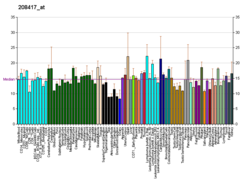
Summary
Fibroblast growth factor 6 is a protein that in humans is encoded by the FGF6 gene.[5][6]
| FGF6 | |||||||||||||||||||||||||||||||||||||||||||||||||||
|---|---|---|---|---|---|---|---|---|---|---|---|---|---|---|---|---|---|---|---|---|---|---|---|---|---|---|---|---|---|---|---|---|---|---|---|---|---|---|---|---|---|---|---|---|---|---|---|---|---|---|---|
| Identifiers | |||||||||||||||||||||||||||||||||||||||||||||||||||
| Aliases | FGF6, HBGF-6, HST2, fibroblast growth factor 6 | ||||||||||||||||||||||||||||||||||||||||||||||||||
| External IDs | OMIM: 134921 MGI: 95520 HomoloGene: 10870 GeneCards: FGF6 | ||||||||||||||||||||||||||||||||||||||||||||||||||
| |||||||||||||||||||||||||||||||||||||||||||||||||||
| |||||||||||||||||||||||||||||||||||||||||||||||||||
| |||||||||||||||||||||||||||||||||||||||||||||||||||
| |||||||||||||||||||||||||||||||||||||||||||||||||||
| |||||||||||||||||||||||||||||||||||||||||||||||||||
| Wikidata | |||||||||||||||||||||||||||||||||||||||||||||||||||
| |||||||||||||||||||||||||||||||||||||||||||||||||||
The protein encoded by this gene is a member of the fibroblast growth factor (FGF) family. FGF family members possess broad mitogenic and cell survival activities, and are involved in a variety of biological processes, including embryonic development, cell growth, morphogenesis, tissue repair, tumor growth and invasion. This gene displayed oncogenic transforming activity when transfected into mammalian cells. The mouse homolog of this gene exhibits a restricted expression profile predominantly in the myogenic lineage, which suggested a role in muscle regeneration or differentiation.[6]
References edit
- ^ a b c GRCh38: Ensembl release 89: ENSG00000111241 – Ensembl, May 2017
- ^ a b c GRCm38: Ensembl release 89: ENSMUSG00000000183 – Ensembl, May 2017
- ^ "Human PubMed Reference:". National Center for Biotechnology Information, U.S. National Library of Medicine.
- ^ "Mouse PubMed Reference:". National Center for Biotechnology Information, U.S. National Library of Medicine.
- ^ Zhang X, Ibrahimi OA, Olsen SK, Umemori H, Mohammadi M, Ornitz DM (Jun 2006). "Receptor specificity of the fibroblast growth factor family. The complete mammalian FGF family". J Biol Chem. 281 (23): 15694–700. doi:10.1074/jbc.M601252200. PMC 2080618. PMID 16597617.
- ^ a b "Entrez Gene: FGF6 fibroblast growth factor 6".
Further reading edit
- Vainikka S, Partanen J, Bellosta P, et al. (1992). "Fibroblast growth factor receptor-4 shows novel features in genomic structure, ligand binding and signal transduction". EMBO J. 11 (12): 4273–80. doi:10.1002/j.1460-2075.1992.tb05526.x. PMC 557000. PMID 1385111.
- Iida S, Yoshida T, Naito K, et al. (1992). "Human hst-2 (FGF-6) oncogene: cDNA cloning and characterization". Oncogene. 7 (2): 303–9. PMID 1549352.
- Coulier F, Batoz M, Marics I, et al. (1991). "Putative structure of the FGF6 gene product and role of the signal peptide". Oncogene. 6 (8): 1437–44. PMID 1886714.
- Marics I, Adelaide J, Raybaud F, et al. (1989). "Characterization of the HST-related FGF.6 gene, a new member of the fibroblast growth factor gene family". Oncogene. 4 (3): 335–40. PMID 2649847.
- Aerssens J, Chaffanet M, Baens M, et al. (1994). "Regional assignment of seven loci to 12p13.2-pter by PCR analysis of somatic cell hybrids containing the der(12) or the der(X) chromosome from a mesothelioma showing t(X;12)(q22;p13)". Genomics. 20 (1): 119–21. doi:10.1006/geno.1994.1136. PMID 8020938.
- Ornitz DM, Xu J, Colvin JS, et al. (1996). "Receptor specificity of the fibroblast growth factor family". J. Biol. Chem. 271 (25): 15292–7. doi:10.1074/jbc.271.25.15292. PMID 8663044.
- Ropiquet F, Giri D, Kwabi-Addo B, et al. (2000). "Increased expression of fibroblast growth factor 6 in human prostatic intraepithelial neoplasia and prostate cancer". Cancer Res. 60 (15): 4245–50. PMID 10945637.
- Duplan SM, Théorêt Y, Kenigsberg RL (2002). "Antitumor activity of fibroblast growth factors (FGFs) for medulloblastoma may correlate with FGF receptor expression and tumor variant". Clin. Cancer Res. 8 (1): 246–57. PMID 11801566.
- Strausberg RL, Feingold EA, Grouse LH, et al. (2003). "Generation and initial analysis of more than 15,000 full-length human and mouse cDNA sequences". Proc. Natl. Acad. Sci. U.S.A. 99 (26): 16899–903. Bibcode:2002PNAS...9916899M. doi:10.1073/pnas.242603899. PMC 139241. PMID 12477932.
- Popovici C, Conchonaud F, Birnbaum D, Roubin R (2004). "Functional phylogeny relates LET-756 to fibroblast growth factor 9". J. Biol. Chem. 279 (38): 40146–52. doi:10.1074/jbc.M405795200. PMID 15199049.
- Gerhard DS, Wagner L, Feingold EA, et al. (2004). "The status, quality, and expansion of the NIH full-length cDNA project: the Mammalian Gene Collection (MGC)". Genome Res. 14 (10B): 2121–7. doi:10.1101/gr.2596504. PMC 528928. PMID 15489334.







